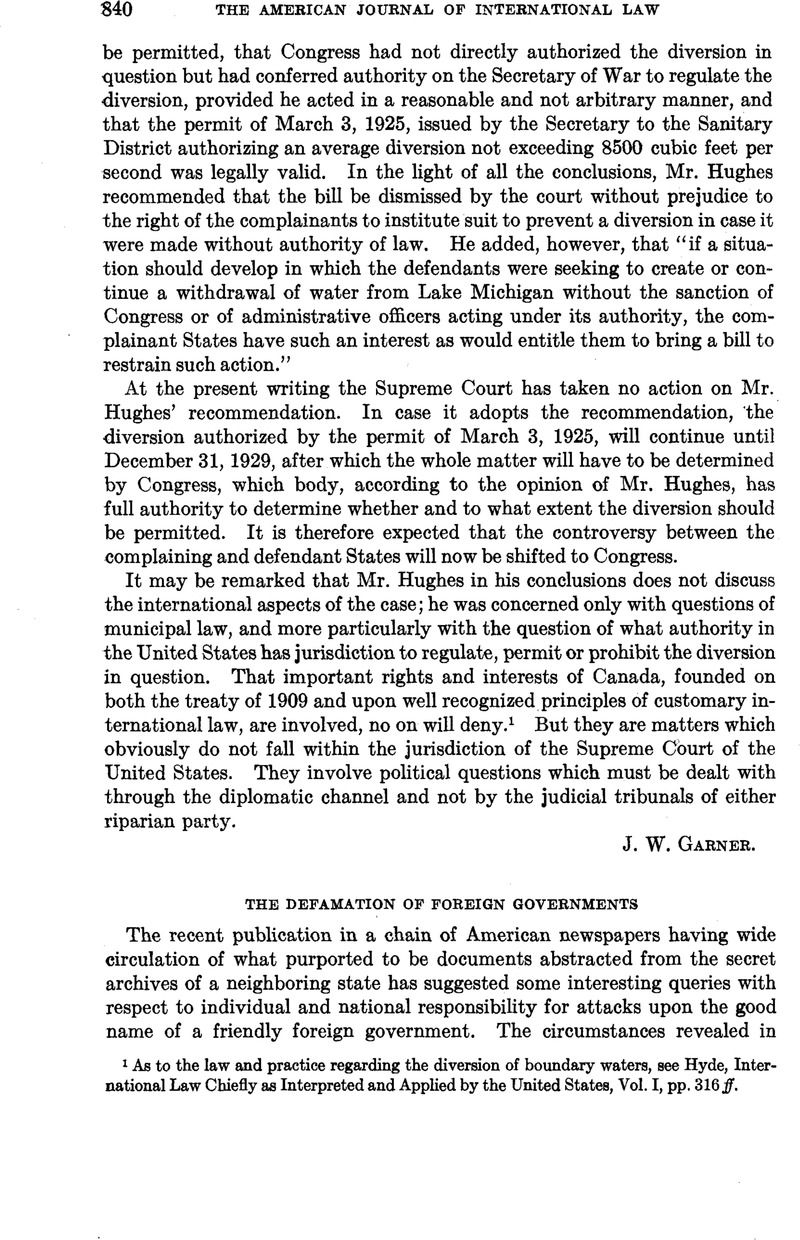Published online by Cambridge University Press: 04 May 2017

1 As to the law and practice regarding the diversion of boundary waters, see Hyde, International Law Chiefly as Interpreted and Applied by the United States, Vol. I, pp. 316 ff.
2 See N. Y. Times, Nov. 15,1927, p. 3, col. 1; Nov. 16, 1927, p. 5, col. 4; Nov. 17, 1927, p. 9, col. 4.
3 The Senate resolution is printed in Hearings, p. 1; also in N. Y. Times, Dec. 10, 1927, p. 3, col. 6.
4 See N. Y. Times, Dec. 21, 1927, p. 18, col. 5.
5 See Hearings, pp. 219, 298, 321, 322, 334; N. Y. Times, Jan. 5, 1928, p. 1, col. 4; Jan. 7, 1928, p. 3, col. 1.
6 See N. Y. Times, Jan. 12, 1928, p. 9, col. 1.
7 A report that the Government of Mexico would sue Hearst for slander was denied by the Acting Foreign Minister of Mexico. N. Y. Times, Jan. 9,1928, p. 2, col. 5.
8 See King v. D'Eon, 1 W. Bla. 510; King v. Gordon, 22 St. Tr. 175; King v. Vint, 27 St. Tr. 627; King . Peltier, 28 St. Tr. 529; Holt, Law of Libel, 1st Am. from 2d London ed., ch. 4; Starkie, Law of Slander and Libel, 3d ed., 657. See also Regina v. Tchowzewski, 8 St. Tr. (N. S.) 1091; Lewis, Foreign Jurisdiction and the Extradition of Criminals, pp. 63 ff.
9 27 St. Tr. 627, 641. The accused had published the following: “ The emperor of Russia is rendering himself obnoxious to his subjects by various acts of tyranny, and ridiculous in the eyes of Europe by his inconsistency; he has now passed an edict prohibiting the exportation of timber, deals, etc. In consequence of this ill-timed law, upwards of 100 sail of vessels are likely to return to this Kingdom without freights.”
10 28 St. Tr. 529,617.
11 Op. cit., 86.
12 Citing King v. D'Eon, supra; King v. Gordon, supra; King v. Vint, supra; and King v. Peltier, supra.
13 Op. cit., 657. See also Russell, Crimes, 9th Am. from 4th London ed., I, 350. “ The reason why libellers in such cases were prosecuted was not simply on the ground of their having libelled foreign Sovereigns, but because such libels were calculated to create a hostile feeling in foreign States, and to cause a breach of the peace between this country and those foreign Powers; and it was therefore proper and just, when such cases arose, that the prosecutions should be conducted, not by the foreign Governments, who were only incidentally involved, but by the law officers of the British Crown—the laws and peace of this country having, in truth, been attempted to be violated, and such probable violation being the real ground of prosecution.” Lord Chancellor Cranworth, in Debate on Foreign Refugees in House of Lords, Hansard, 3d series, CXXIV, 1046, 1059, 1060.
14 U. S. Const., I, viii, 10.
15 U. S. Criminal Code of 1909, §§ 9-18, 35 U. S. Stat. L. 1088,1089; Act of 1917, c .30, Tit. V, 40 U. S. Stat. L. 217,221; U. S. Code Ann., Tit. 18, §§ 21-38.
16 U. S. Rev. Stat., §§ 4062-4065; U. S. Code Ann., Tit. 22, §§ 251-255. See Respublica v. De Longchamps, 1 Dali. 111.
17 U. S. Criminal Code o f 1909, §§ 156-161, 35 U. S. Stat. L. 1088,1117; U. S. Code Ann., Tit. 18, §§ 270-275. See Emperor of Austria v. Day, 2 Giff. 628; United States v. Arjona, 120 U. S. 479.
18 Act of 1918, 40 U. S. Stat. L. 821.
19 Act of 1917, c. 30, Tit. VIII, § 5, 40 U. S. Stat. L. 217, 226.
20 In addition to legislation for enforcement of neutrality cited note 15, supra, see Joint Resolution of 1922,42 U. S. Stat. L. 361; U. S. Code Ann., Tit. 22, §§ 236-237. See DeWutz v. Hendricks, 2 Bing. 314; Kennett v. Chambers, 14 How. 38.
21 See U. S. Rev. Stat. §§ 4071-4073. Cf. U. S. Rev. Stat. §§ 753. Cf. also Act of 1917, c. 30, Tit. II, § 3, and Tit. VIII, § 2, 40 U. S. Stat. L. 217, 220, 226.
22 Canada's Criminal Code contains the following: “ Every one is guilty of an indictable offence and liable to one year's imprisonment who, without lawful justification, publishes any libel tending to degrade, revile or expose to hatred and contempt in the estimation of the people of any foreign state, any prince or person exercising sovereign authority over such state.” Revised Statutes of 1927, c. 36, §135.